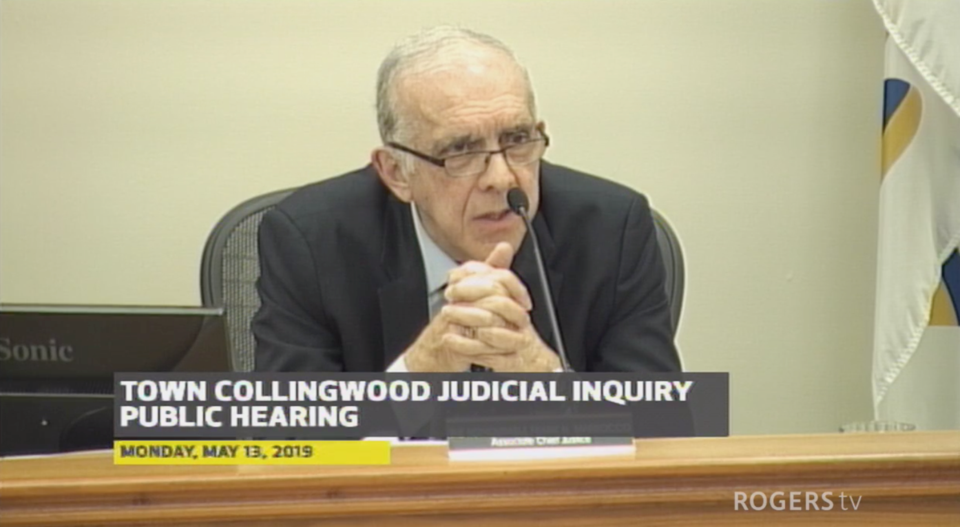The commissioner of the Collingwood Judicial Inquiry has recommended 306 changes to municipal governance as a result of the public investigation that began in 2018.
Commissioner Frank Marrocco, the associate chief justice who led the inquiry, delivered his four-volume report today.
“It was a significant task,” noted Marrocco as he delivered a brief address to media today at noon. “It is rather like a large puzzle where you may or may not have all the pieces but where, in any event, you do not see in advance what the picture will turn out to be.”
The inquiry was called to investigate the 50 per cent share sale of Collus electrical utility to PowerStream, and the subsequent spending of share sale proceeds on two fabric membrane structures in Collingwood.
As well, the inquiry was tasked with investigating who received money as a result of the share sale and building the recreational facilities.
“Undisclosed conflicts, unfair procurements, and lack of transparency stained both transactions, leading to fair and troubling concerns from the public,” states Marrocco in his report. “The evidence I heard and the conclusions I have drawn show that those concerns were well founded. When the answers to legitimate questions are dismissive, spun, or obfuscated, public trust further erodes.”
The report addresses the “generational” personal relationships between then-mayor Sandra Cooper; her brother Paul Bonwick who acted as a consultant for both PowerStream and the construction company contracted to build the recreational facilities; Ed Houghton, who held many roles in town and Collus leadership positions, and then-deputy mayor Rick Lloyd.
Marrocco noted Lloyd gave Bonwick confidential, non-public town information, that Bonwick was an advisor to Cooper, and that Houghton “enjoyed unusual influence and freedom in his roles with the town and Collus corporations.”
“The origins of the Collus Power share sale can be traced to a series of unofficial conversations and private meetings,” states Marrocco’s report.
He further states PowerStream was given several unfair advantages through the actions of Houghton and Bonwick.
“With Mr. Houghton at the helm, Collus Power – the town’s asset – was in charge of selling itself, and the town – the owner of the asset – had no effective control over the process,” stated Marrocco in his report. “This unusual dynamic did not serve the town’s interest.”
When the time came to vote on the Collus share sale in 2012, Marrocco's report states three of the eight councillors who voted (Jan. 23, 2012), had undisclosed conflicts of interest “which further undermined an already flawed process.” The three members of council included Sandra Cooper, Ian Chadwick and Rick Lloyd.
On the matter of the recreation facilities, Marrocco’s report again noted non-public conversations and dealings between Lloyd, Houghton and Bonwick, and inaccurate information provided to council to favour a preferred outcome of Sprung structures built by BLT.
Marrocco explained during today’s briefing that his report is findings of fact and statements of opinion, and not findings of criminal or civil liability.
“I hope my report will be helpful in the future to the Town of Collingwood and, for that matter, to any other municipality facing similar issues,” he said. “My inquiry is complete … it is now up to the municipal leaders to consider how to react or act on my recommendations.”
Marrocco noted in his report the road back to trust between the public and municipal government is “arduous” and the relationship “may never be the same.”
The inquiry lead counsel, Kate McGrann, confirmed the work of the inquiry is complete and there will be no follow up from the inquiry on whether any of the recommendations are implemented.
However, the final recommendation is for Collingwood council to report to the public one year from today on how many and what recommendations have been implemented.
The 306 recommendations include suggestions for changes to the Municipal Act, and the Municipal Conflict of Interest Act, as well as to Collingwood’s governance bylaws.
The changes suggest updates to the municipal code of conduct to broaden the definition of pecuniary interest to include more extended family members.
Marrocco also suggests the province should require codes of conduct for staff of municipalities and he sets out several recommendations for what those codes should include.
His recommendations also touch on procurement policy, council codes of conduct, defining the lines between council and staff roles and relationships, lobbyist registry, and annual financial disclosure for all members of council.
CollingwoodToday.ca will have more soon on the recommendations included in the final inquiry report. You can see all four volumes of the report online on the Collingwood Judicial Inquiry website.